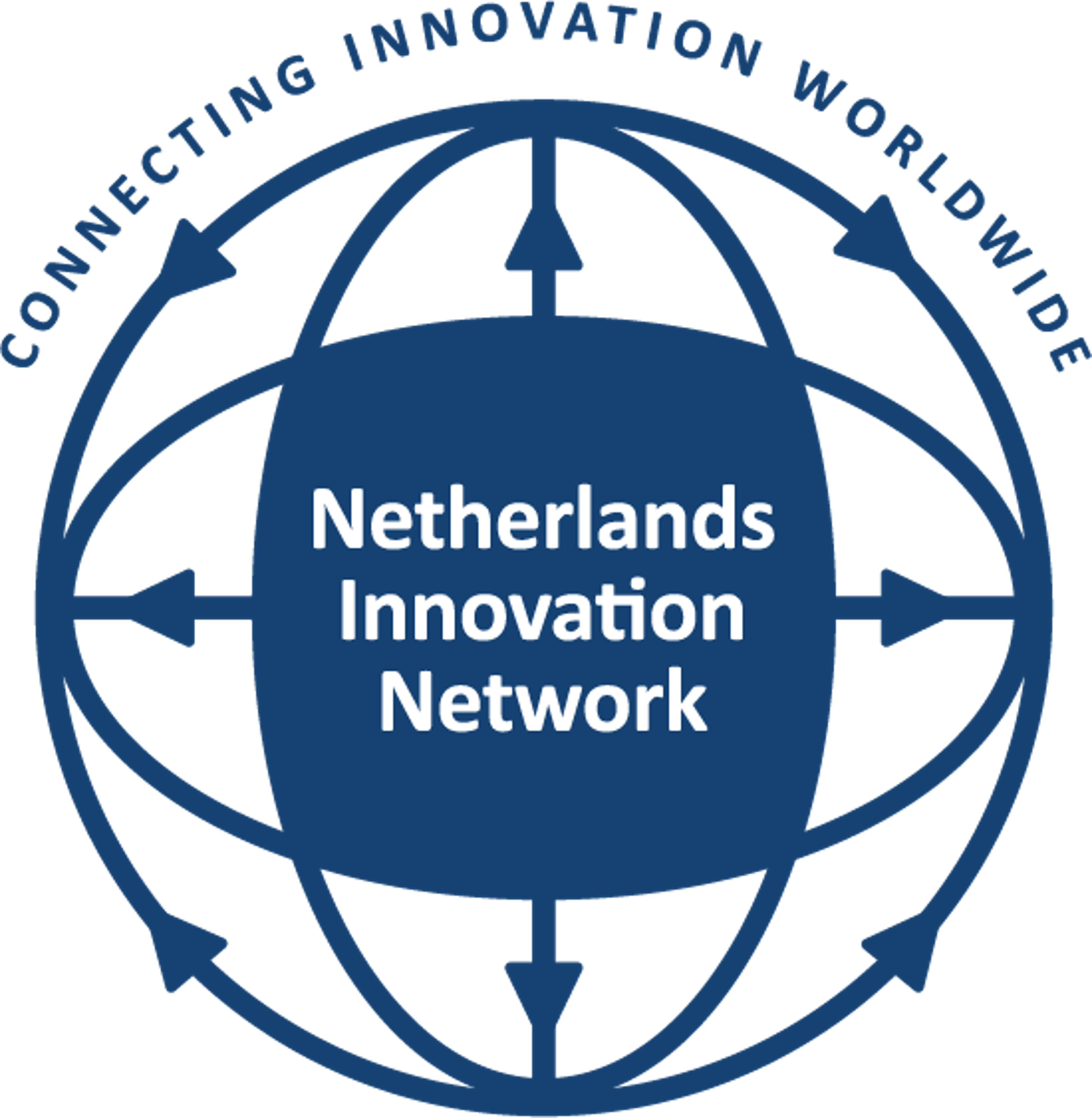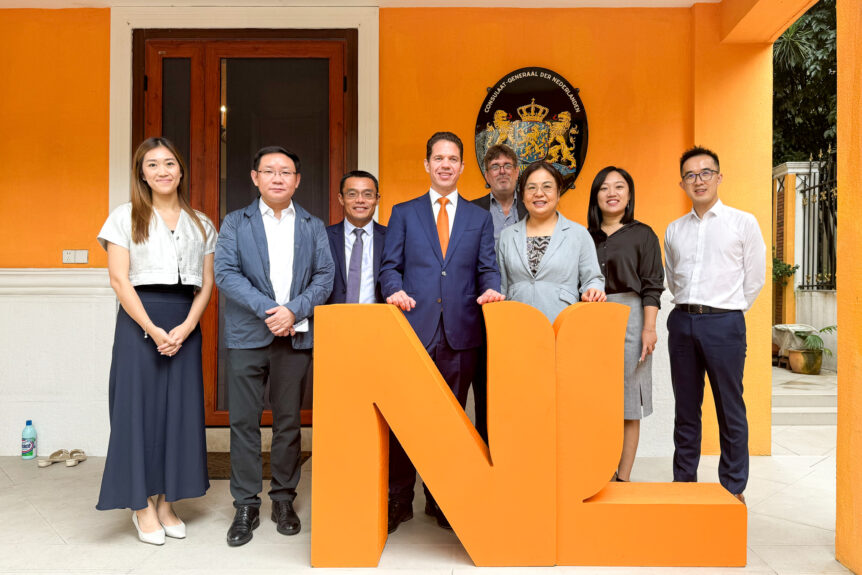On 31 July 2024, the Netherlands Innovation Network China organised a seminar on the potential applications of sustainable feedstocks. The event focused on how plastic waste, biomass, and captured carbon can be used in various applications. Experts from both the Netherlands and China shared insights from government policies, research, and trade perspectives.
The seminar highlighted the importance of the circular economy in addressing climate change, emphasising the need to reduce waste and make the most of our resources. The Netherlands aims to halve raw material consumption by 2030 and achieve a fully circular economy by 2050. Collaborative efforts with China, the world’s largest plastics producer, consumer, and recycler, are crucial for this transition.
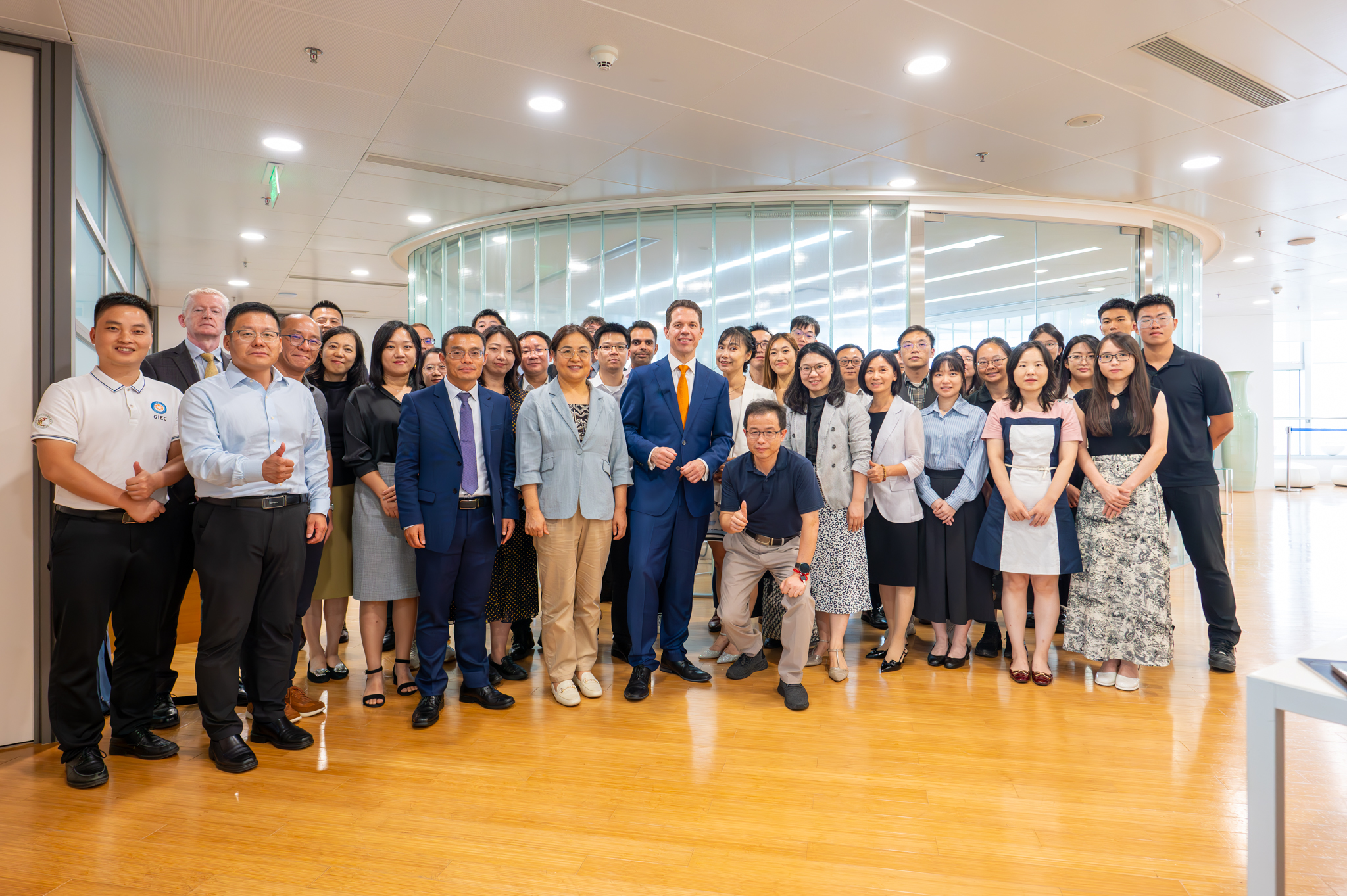
In the realm of chemistry, where fossil feedstock have long been the backbone, finding sustainable alternatives is paramount. Shifting to sustainable feedstocks and converting it for desired applications are pivotal to address climate challenges. Achieving this vision requires a fundamental shift in how materials are source and utilised, presenting opportunities for innovation and development of new technologies in this field.
In this context, on 31 July 2024, our colleague in Guangzhou Wielande Li of the Netherlands Innovation Network China organised a seminar on the potential applications from sustainable feedstocks together with Karin Han at the Consulate General of the Netherlands in Guangzhou. The seminar, named: “Towards circular cities: potential applications from sustainable feedstocks” looked at how plastic waste, biomass, and captured carbon can be used in different applications. Experts from the Netherlands and China shared their views from government, research, and trade perspectives.
The seminar showed how important the circular economy is for tackling climate change. It stressed the need to reduce waste and use resources more efficiently. The Netherlands aims to halve raw material use by 2030 and have a fully circular economy by 2050. Working with China, the world’s largest producer, consumer, and recycler of plastics, is crucial for this transition.
The seminar was a chance to find areas of collaboration, expand networks, and encourage innovation. This dialogue is part of our strategy to tackle global challenges and promote sustainable practices through international cooperation. This event is part of our circular cities dialogue series, which aims to promote green transitions and sustainable development.
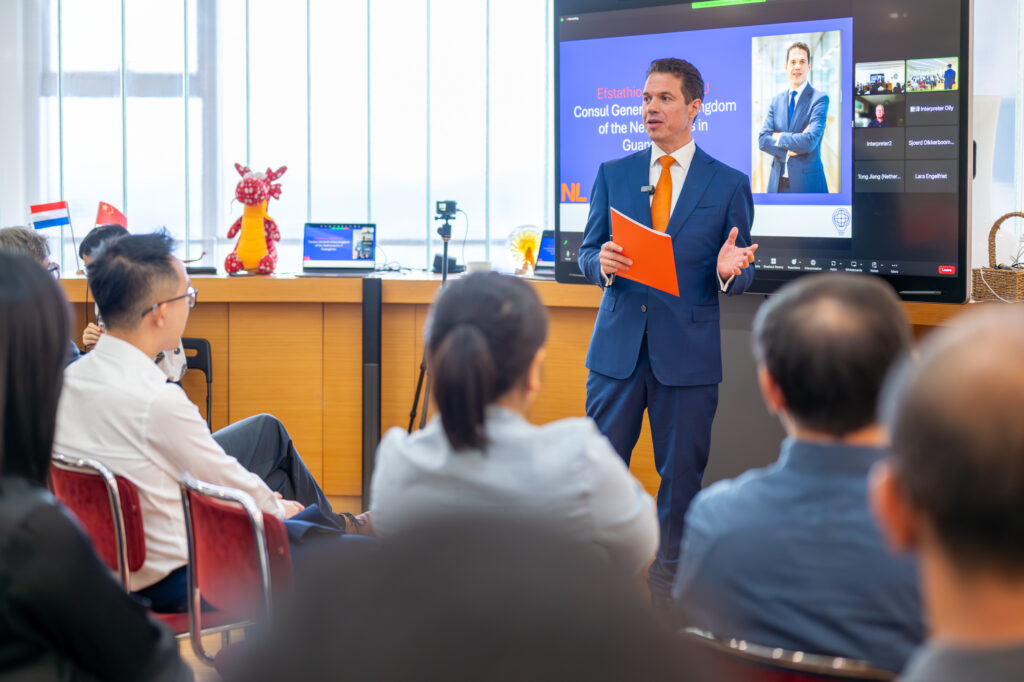
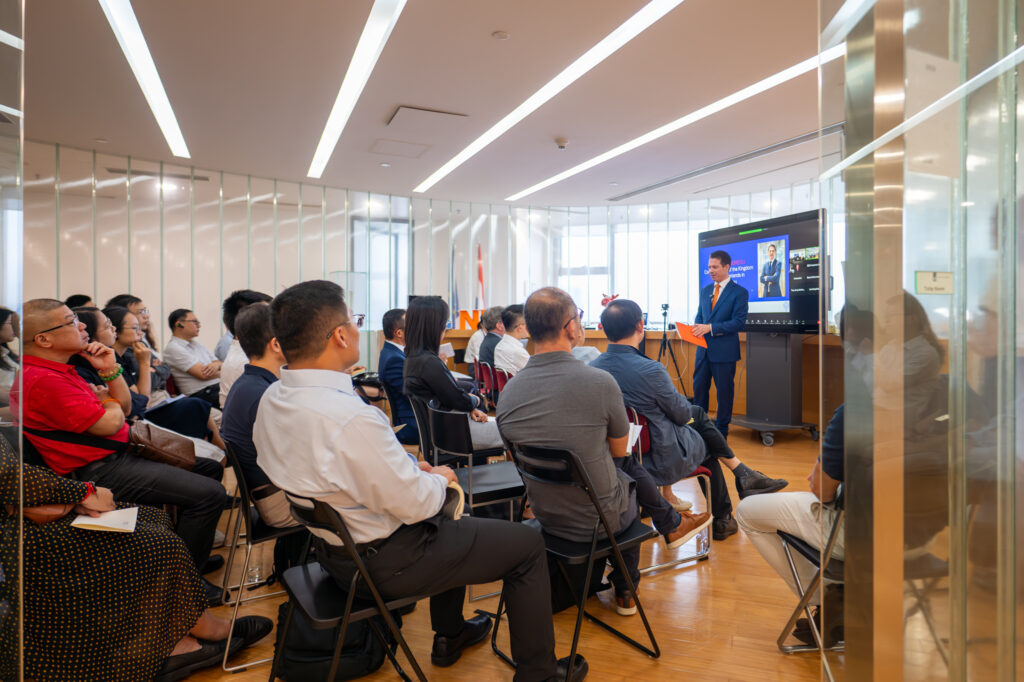
Consul General Efstathios Andreou opened the seminar with a speech about the urgent environmental crises we face today. He talked about the rate at which we are depleting natural resources and the need to shift towards a circular economy. He used statistics to highlight current consumption patterns and their impact on the planet, stressing the need for innovative solutions and international cooperation to tackle these challenges.
“Our economies currently need 1.6 Earths, meaning we are using 60% more resources than the planet can sustainably provide. By 2050, we will need between three and four Earths. We cannot solve this by making new worlds; we have only one beautiful blue planet, and that is the Earth.”
Efstathios Andreou
He called for a shift in how we live and consume, advocating for circular economy solutions that protect the planet and present economic opportunities.
“The Netherlands and China share a mindset that we can do both: protect the planet and make money. The circular economy is about reducing waste and making the most out of the resources we have. It aligns with sustainability principles, offering innovative solutions to environmental challenges,”
Efstathios Andreou
Andreou concluded, expressing optimism about Dutch-Chinese collaboration in achieving these goals.
Driving developments in The Netherlands & European perspective
Frank, Head of International Activities at the consortia Knowledge and Innovation of the Top Sector Chemistry in the Netherlands, gave the first presentation. He talked about the Dutch chemical ecosystem and its sustainability advancements. He emphasised the importance of international cooperation, especially with China, in driving innovations in circular plastics, bio-based materials, and carbon capture and utilisation (CCU).
Frank explained the goals of the Dutch chemical sector, aiming to be a global leader in green and sustainable chemistry by 2050. He detailed the collaborative framework that drives innovation in the Netherlands, involving industry leaders, academic institutions, and government support. This ecosystem has led to significant advancements in areas like plastic recycling, bio-based materials, and CCU technologies.
“We are very advanced and innovative,” Frank said. “There is a large collaboration between industry, universities, and knowledge centres, and the government strongly supports our efforts. Our goal is to connect the Dutch chemical ecosystem with China to find solutions for sustainability in the areas of circular plastics, bio-based materials, and CCU.”
He highlighted several key projects and programmes pushing the boundaries of green chemistry and sustainable feedstocks. He discussed the importance of mechanical and chemical recycling in achieving circular plastics, emphasising the need for new technical developments and market incentives to foster collaboration and innovation. He also outlined the ambitious Circular Plastics Alliance, a public-private partnership in the Netherlands aimed at developing advanced recycling technologies and fostering collaboration across the value chain.
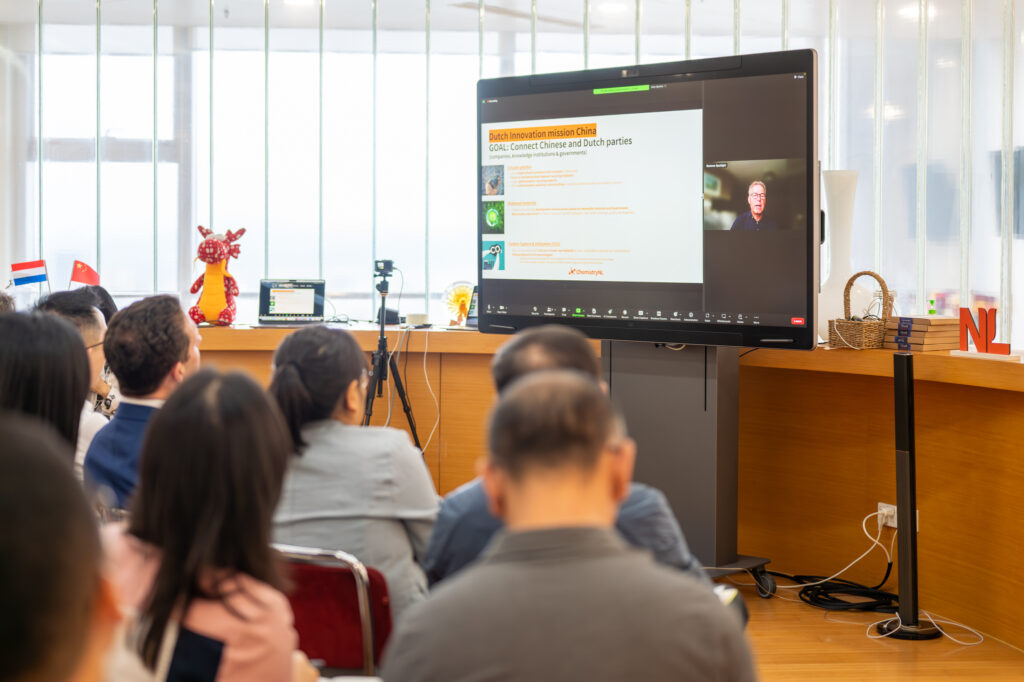
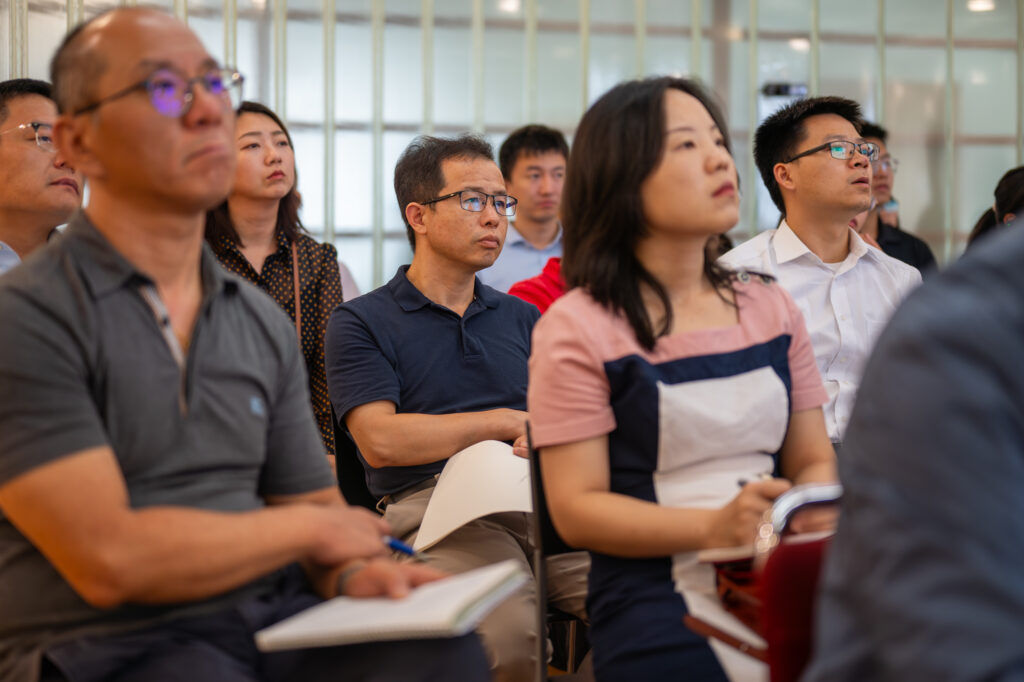
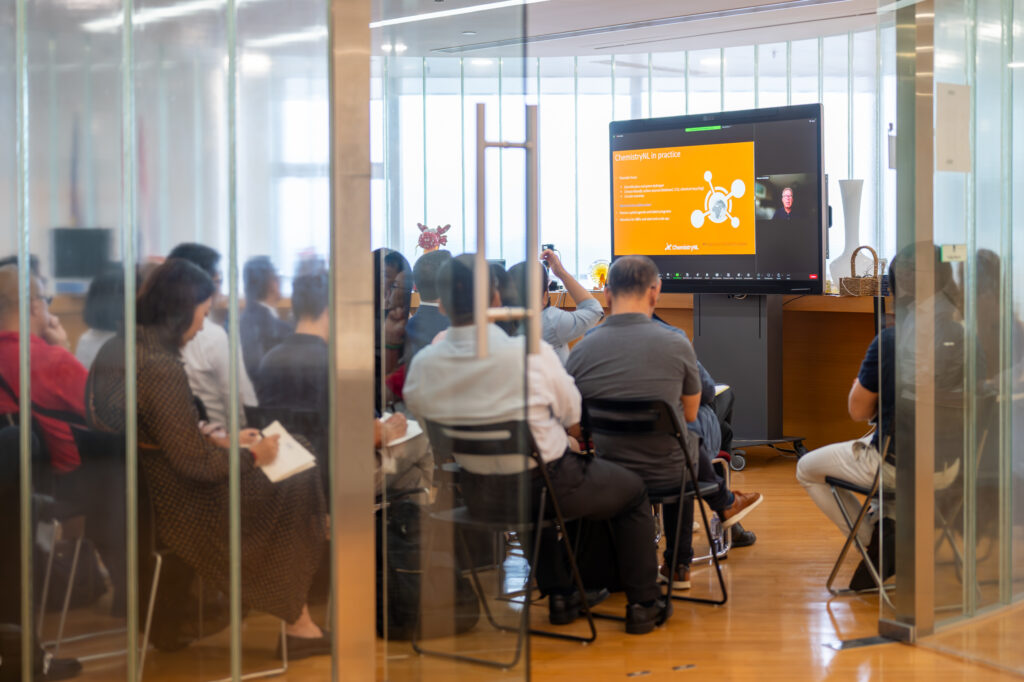
Driving developments in China & International perspective
Dr. Nanqing Jiang, founder of the Institute of Carbon Neutrality and Circular Economy, followed with a presentation on developments in China. She talked about the bio-based economy and its integration with the circular economy, highlighting China’s significant progress in this area. She explained the classification of bio-based chemicals and their applications, noting the international and national policies driving this transition. She emphasised the importance of stable raw material supply chains and market applications, presenting innovative cases of bio-material usage in energy and material production.
“China has made significant progress in developing bio-based materials and integrating them into the circular economy,” Dr. Jiang said. “Our policies are encouraging the use of bio-materials to replace fossil fuels and reduce carbon emissions. However, challenges remain in ensuring stable raw material supplies and developing market applications for these materials.”
She gave an overview of the bio-based chemicals sector in China, highlighting different categories of bio-based chemicals such as acids, alcohols, aldehydes, and bio-hydrocarbons. She discussed the drivers behind the development of this sector, including international climate change agreements and national policies aimed at achieving carbon neutrality.
One key challenge, according to Dr. Jiang, is the competition between bio-materials and food production. She emphasised the need to use agricultural waste and non-food biomass to avoid conflicts with food supplies. She also highlighted the importance of developing efficient conversion technologies and stable supply chains to ensure the viability of bio-based materials in the market.
“We are working on initiatives such as the China Circularity 100, which aims to promote the use of bio-materials in various sectors and develop methodologies for assessing their environmental impact,” Dr. Jiang explained. “By collaborating with international partners and sharing best practices, we can accelerate the transition to a circular economy and achieve our sustainability goals.”
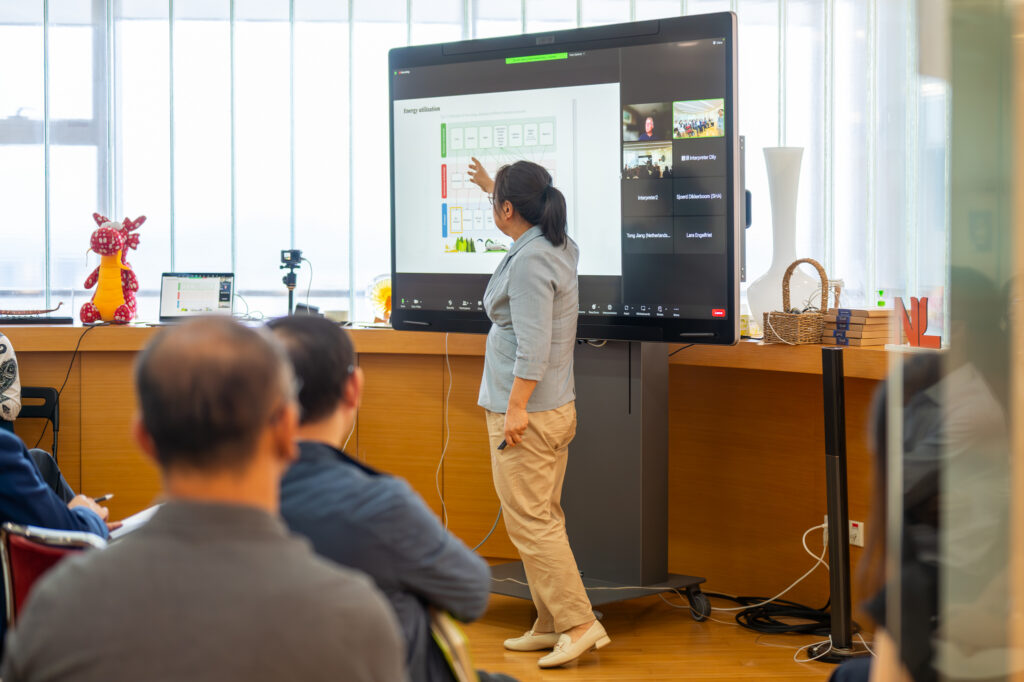
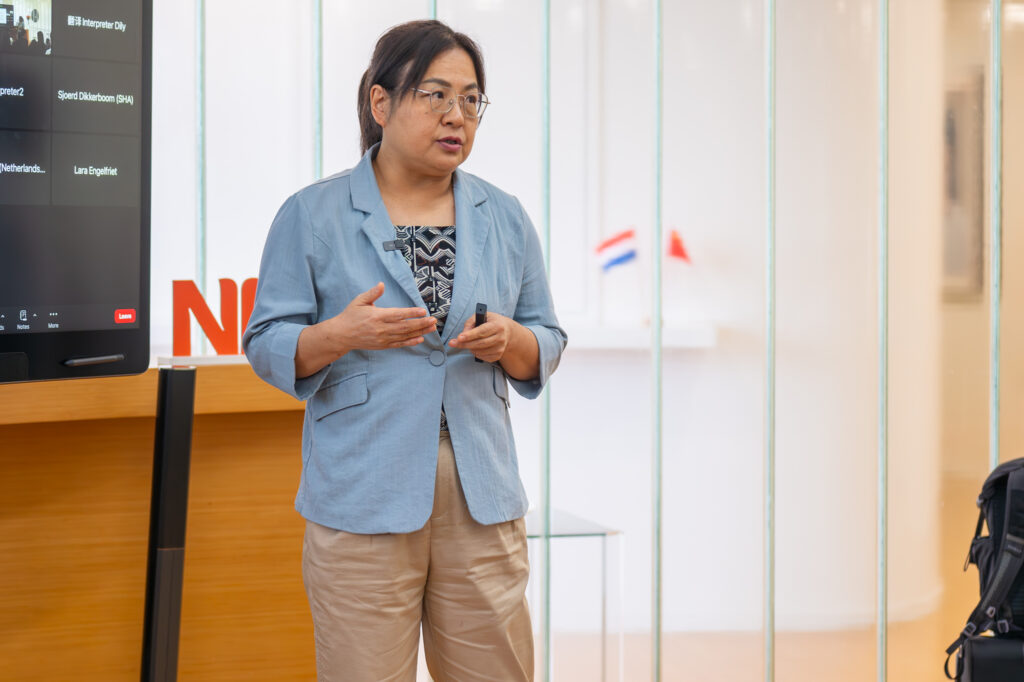
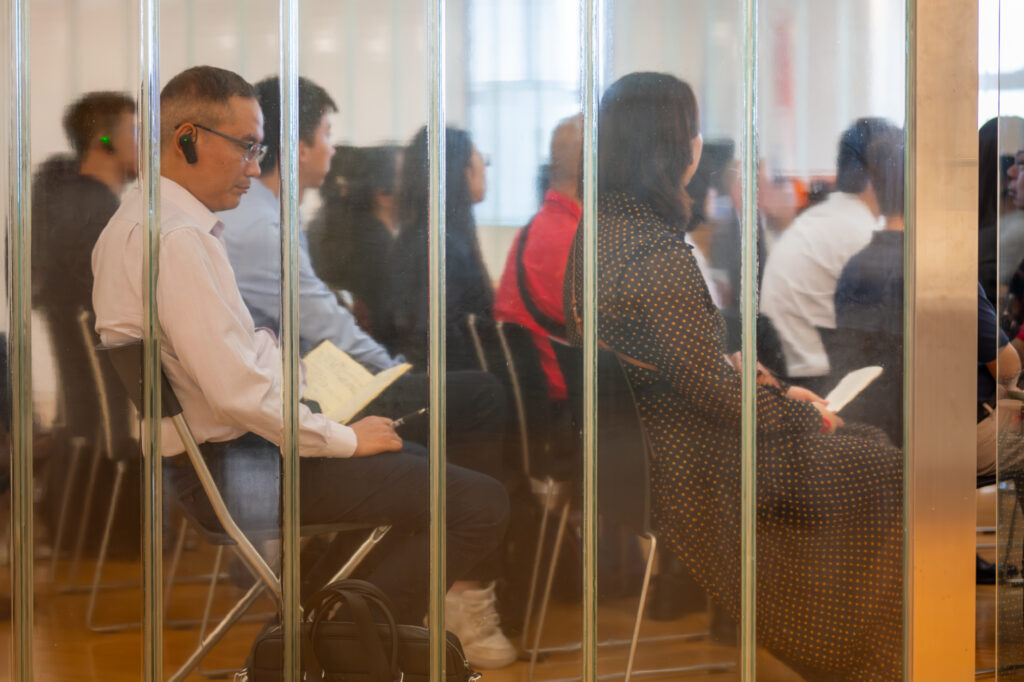
Biomass gasification and chemical synthesis at Wison Engineering
Hengwei Liu, Chief Technology Officer of Wison Engineering and Chairman of the Multinational Corporations Forum for Carbon Neutrality (MNC50), presented a detailed discussion on his company’s efforts in the engineering consultancy sector and their drive towards carbon neutrality. Wison Engineering, based in Shanghai, is unique in China for its specialisation in floating LNG technologies, which helps to bridge the gap between natural gas production and the global market.
Mr. Liu highlighted his responsibility in driving technological innovation for deep decarbonisation in various industrial sectors. He mentioned two significant projects: a carbon capture and storage (CCS) project in Shanghai and a methanol production project using biomass gasification. The Shanghai project, in collaboration with China University of Science and Technology and a local state-owned company, aims to capture CO2 emissions from a coal power plant’s flue gas and combine it with hydrogen to produce methanol. This demonstration plant is expected to be operational by Christmas, showing the potential of CCS technologies in reducing carbon emissions. The methanol production project focuses on using biomass gasification to produce sustainable methanol and ammonia for the maritime and aviation sectors. Current projects in China demonstrate the capacity to produce large quantities of methanol, highlighting its potential to contribute to global decarbonisation efforts.
Mr. Liu also talked about the economic and technological challenges in reducing carbon emissions in different sectors, emphasising the importance of finding commercially viable solutions. He called for international collaboration, inviting partners to work on innovative technologies to drive the transition to a sustainable energy future.
In his presentation, Liu underscored the importance of CCS and the development of green fuels for the maritime and aviation industries. He discussed the potential of using biomass gasification to produce sustainable fuels and the need for continued innovation to overcome the economic challenges associated with these technologies.
In conclusion, Hengwei Liu’s presentation highlighted Wison Engineering’s strategic initiatives in advancing CCS technologies and developing sustainable fuels. His emphasis on international collaboration and innovation showed the importance of a collective effort in achieving carbon neutrality and addressing global environmental challenges.
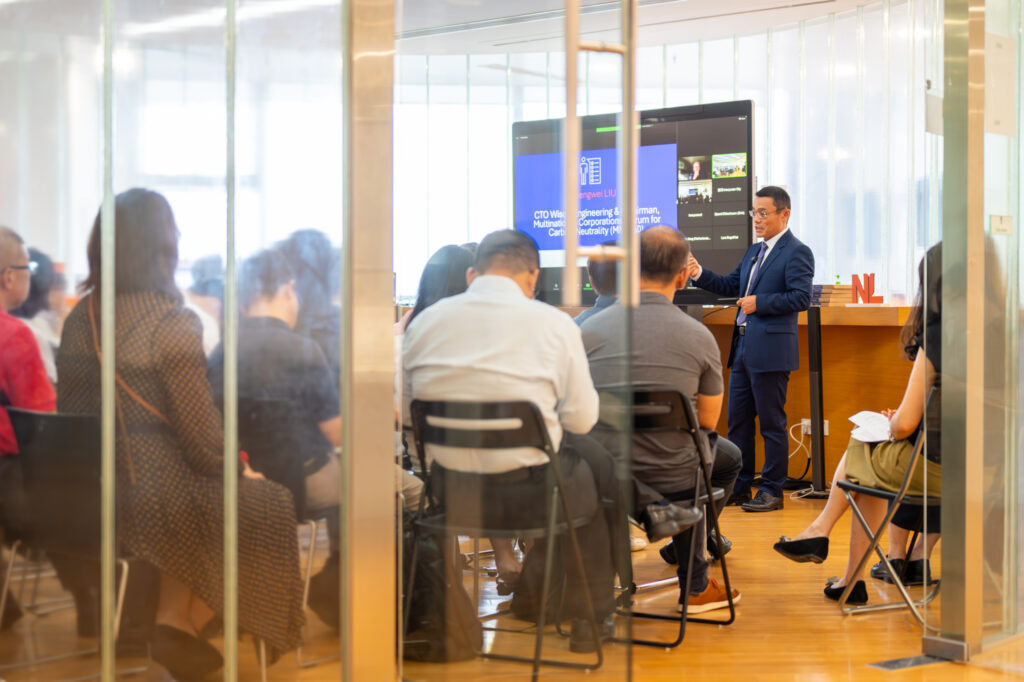
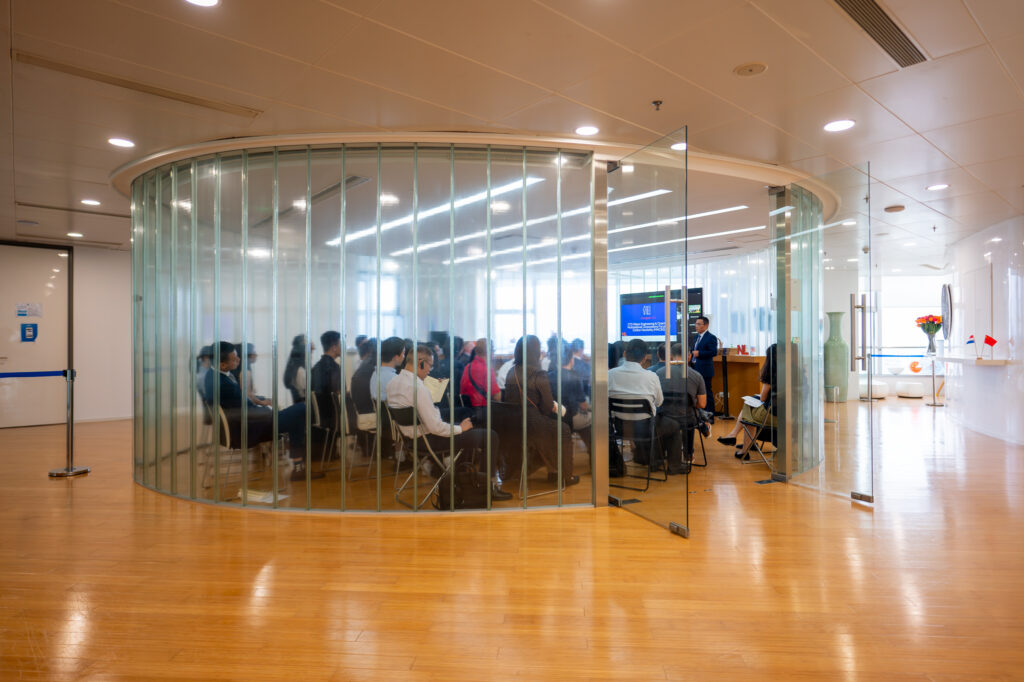
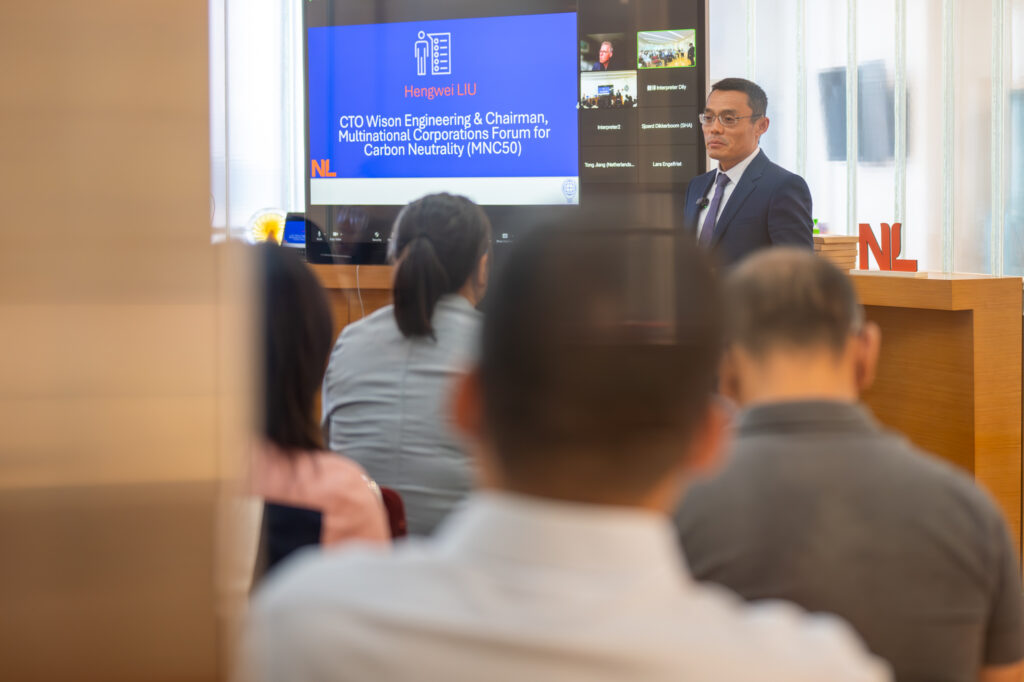
Material flows & The Netherlands – China collaboration
Dr. Arnold Tukker, Chair and Professor of Industrial Ecology at Leiden University, brought an academic perspective to the discussion. He provided a crash course in material flow analysis (MFA) and lifecycle assessment (LCA), demonstrating how these methodologies can guide investments and avoid costly lock-ins. He gave examples illustrating the complexities and trade-offs involved in making sustainable technological choices, such as in hydrogen production and steel manufacturing. His emphasis on thorough assessments to identify the most effective and sustainable solutions resonated with the audience, reinforcing the need for careful planning and evaluation in pursuing circular economies.
“MFA and LCA are essential tools for understanding the environmental impact of different technologies and making informed decisions,” Dr. Tukker said. “These assessments help us identify the most sustainable options and avoid costly investments in technologies that may not deliver the desired environmental benefits.”
One of the case studies presented by Dr. Tukker involved the use of hydrogen as a sustainable energy carrier. He explained how different production methods, such as steam reforming and electrolysis, have varying environmental impacts depending on the energy sources used. By analysing the entire lifecycle of hydrogen production, Dr. Tukker demonstrated the importance of considering long-term sustainability and avoiding lock-ins with less efficient technologies.
Another case study focused on the use of CCU technologies in the steel industry. Dr. Tukker discussed the potential of converting carbon emissions from steel production into valuable chemicals, such as polyols used in producing polyurethane. While this approach can reduce carbon emissions, Dr. Tukker emphasised the need for thorough assessments to ensure the overall environmental impact is minimised.
“Innovations in CCU and other circular economy solutions offer great potential, but we must carefully evaluate their environmental and economic viability,” Dr. Tukker concluded. “By applying precise assessments, we can make informed decisions and drive the transition to a sustainable future.”
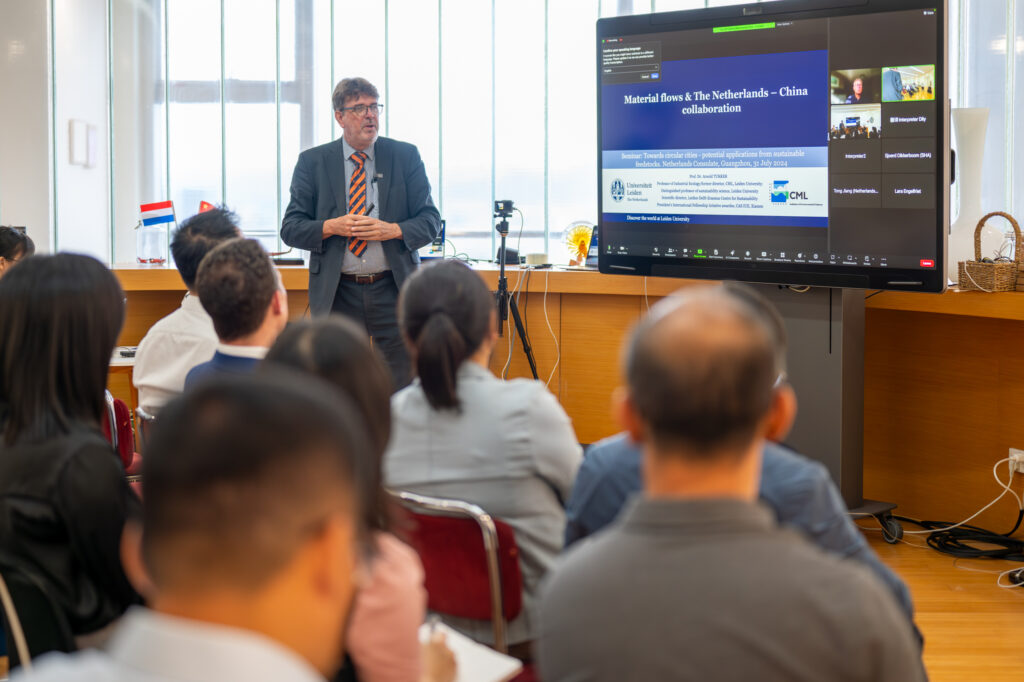
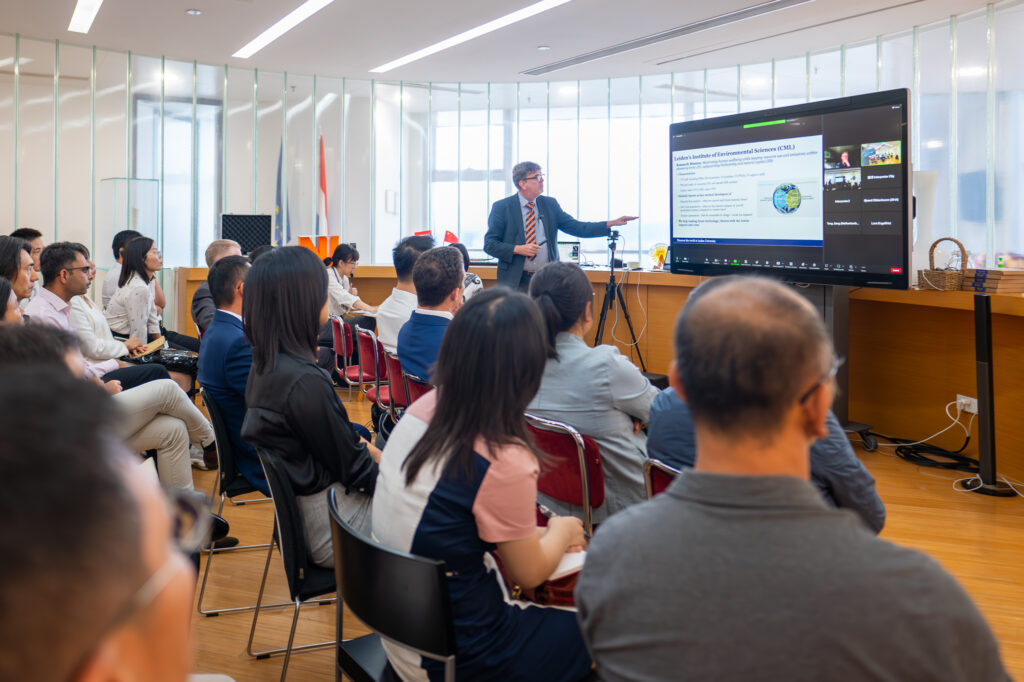
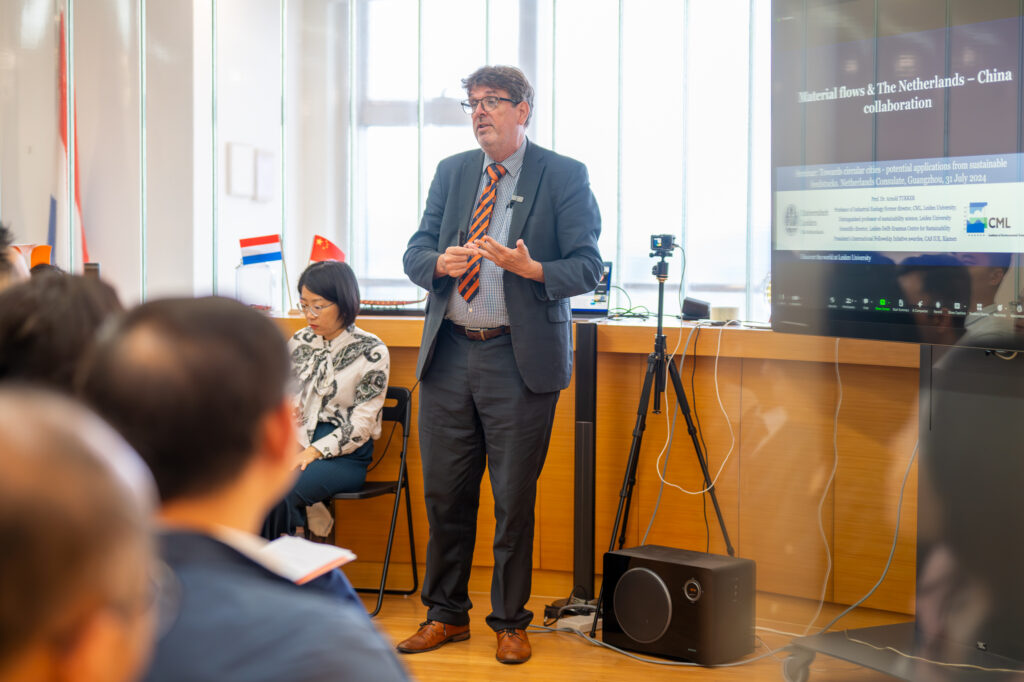
Engineered (living) biomaterials for sustainability and therapies
Professor Chao Zhong from the Shenzhen Institute of Advanced Technology presented on engineered living biomaterials, showcasing innovative applications of synthetic biology in creating sustainable and tunable materials. His work highlighted the potential of living materials to revolutionise industries by offering eco-friendly alternatives with unique properties. Professor Zhong’s presentation provided a fascinating glimpse into the future of materials science, illustrating how biological principles can inspire new solutions for sustainability.
“Engineered living materials offer exciting possibilities for creating sustainable and adaptable materials,” Professor Zhong began. “By harnessing the power of synthetic biology, we can develop materials that are not only environmentally friendly but also have unique properties such as self-healing and responsiveness to environmental changes.”
One example presented by Professor Zhong was a microbial textile dyeing process that uses engineered bacteria to produce and apply dyes directly onto fabrics. This innovative approach eliminates the need for toxic chemicals and reduces water consumption in the dyeing process. By engineering bacteria to produce different pigments, Professor Zhong’s team has created a range of vibrant colours that can be applied to textiles in a single step.
Another example was the development of mycelium-based composites, which use fungal mycelium to create strong and lightweight materials. These composites can be used in various applications, from construction materials to packaging. Professor Zhong explained how mycelium can be grown on agricultural waste, providing a sustainable source of raw materials and reducing waste.
“These living materials offer a new paradigm for sustainable material production,” Professor Zhong stated. “They are renewable, biodegradable, and can be produced using low-energy processes. By integrating these materials into various industries, we can significantly reduce our environmental footprint and create a more sustainable economy.”
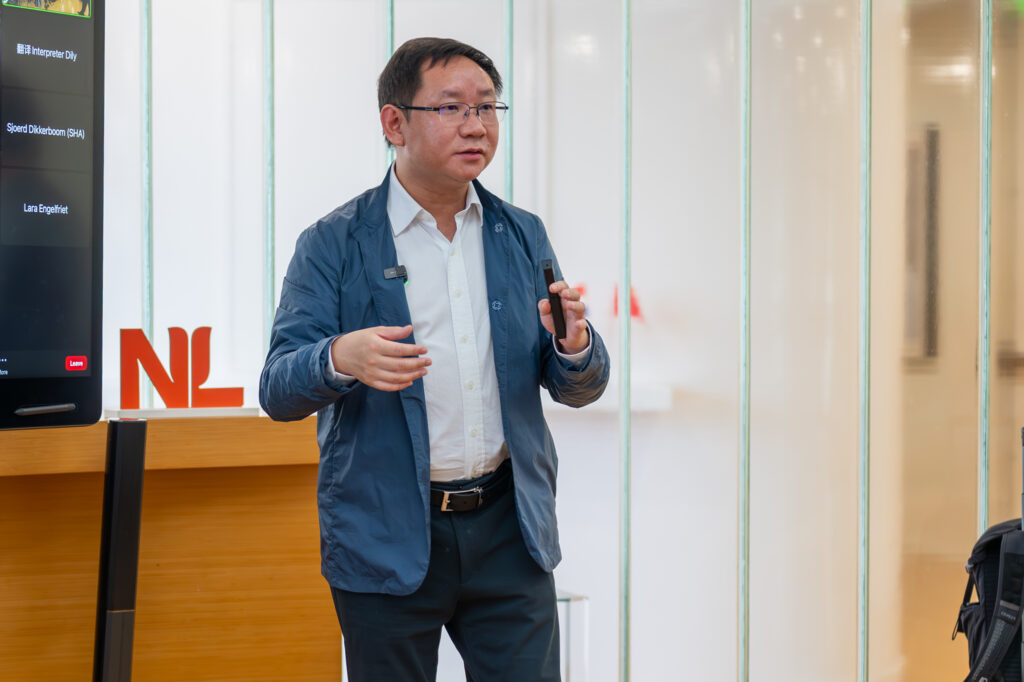
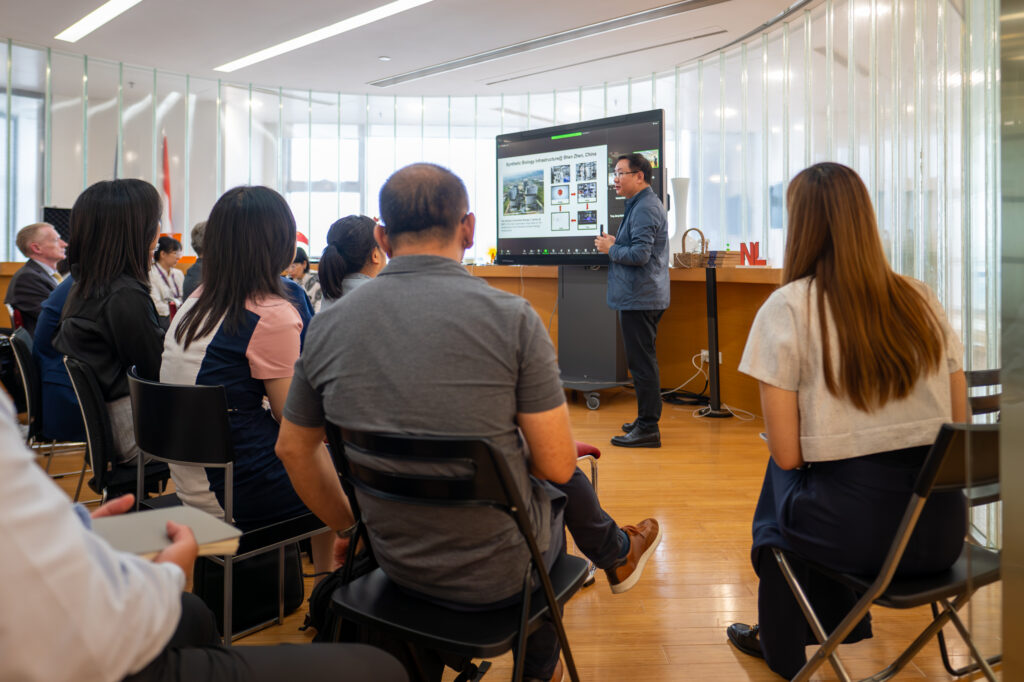
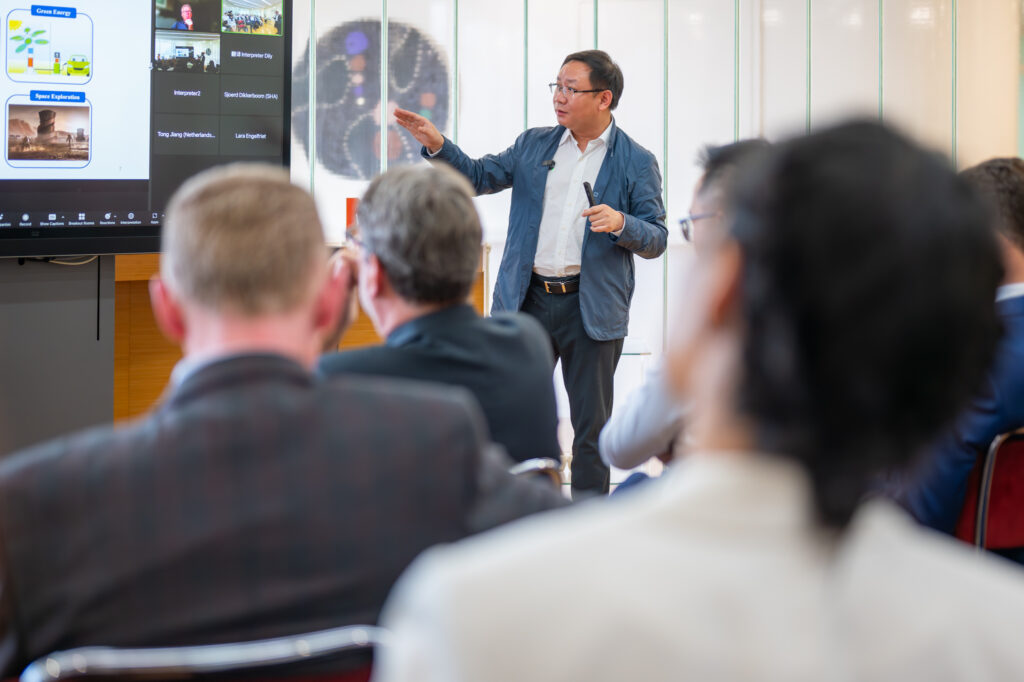
Captured carbon as feedstock for new applications & international collaboration
Dr. Felix Xia, Project Director of the China-UK Guangdong CCUS Centre, discussed the potential of carbon capture, utilisation, and storage (CCUS) technologies. He provided an overview of the various pathways for utilising captured CO2, from enhancing oil recovery to producing valuable chemicals and materials. Dr. Xia’s insights into the economic and technological challenges of CCUS underscored the need for continued innovation and international collaboration to make these solutions viable. His presentation highlighted several breakthroughs in China, demonstrating the country’s commitment to advancing CCUS technologies.
“CCUS is a critical technology for reducing carbon emissions and achieving climate goals,” Dr. Xia stated. “By capturing and utilising CO2, we can turn a waste product into a valuable resource and create new economic opportunities.”
Dr. Xia provided an overview of the current state of CCUS technologies in China, highlighting several innovative projects. One such project involves using CO2 to produce carbon nanotubes, which are used in the production of lithium batteries for electric vehicles. This technology not only reduces carbon emissions but also provides a valuable material for the growing electric vehicle market.
Another project is the use of CO2 to produce methanol, a versatile chemical that can be used as a fuel or as a feedstock for the chemical industry. Dr. Xia explained how renewable energy sources, such as solar and wind power, can be used to produce hydrogen, which is then combined with captured CO2 to produce methanol. This approach provides a sustainable pathway for producing methanol and reducing carbon emissions.
Dr. Xia also discussed the potential of using industrial waste materials, such as steel slag and fly ash, to absorb and store CO2. These materials can be treated to capture CO2 and then used to produce building materials, providing a sustainable solution for waste management and carbon storage.
“CCUS technologies offer significant potential for reducing carbon emissions and creating new economic opportunities,” Dr. Xia concluded. “However, continued innovation and international collaboration are essential to overcome the economic and technological challenges and make these solutions viable.”
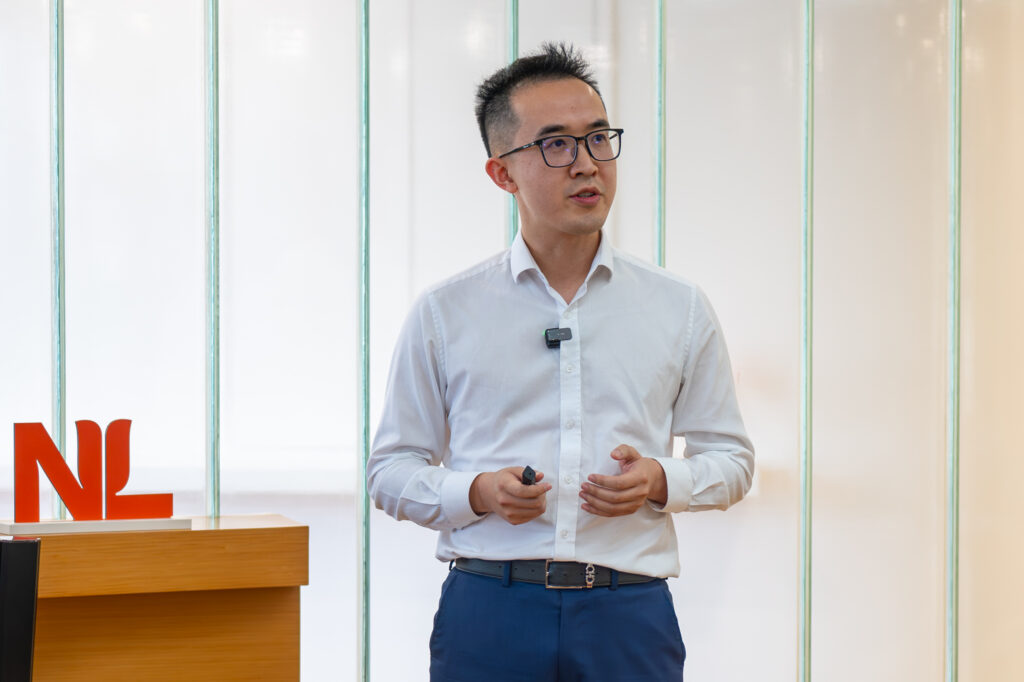
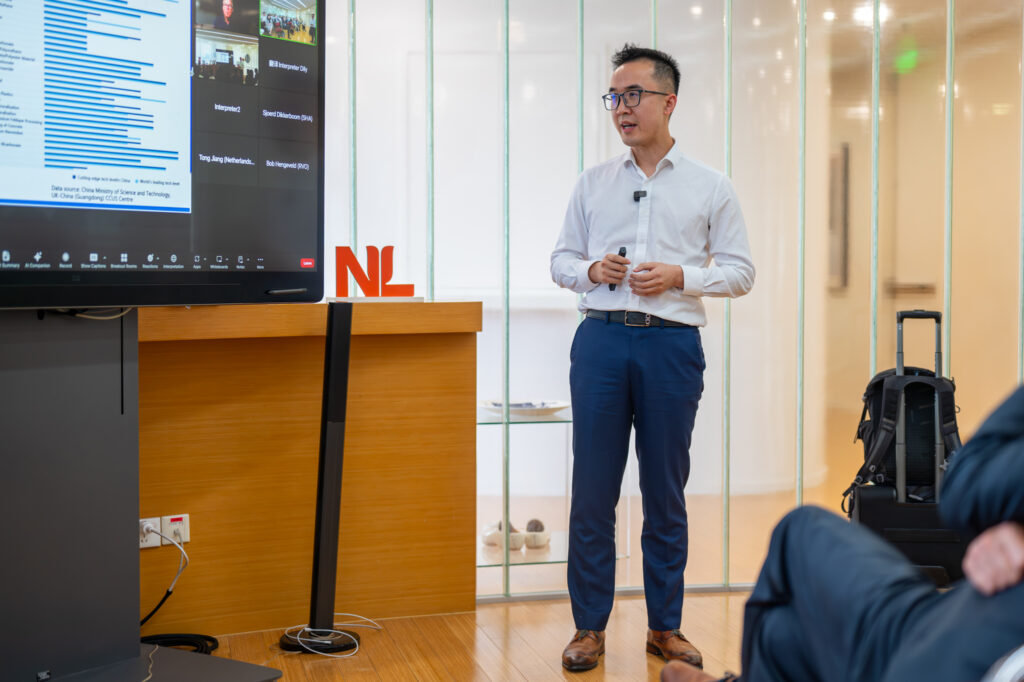
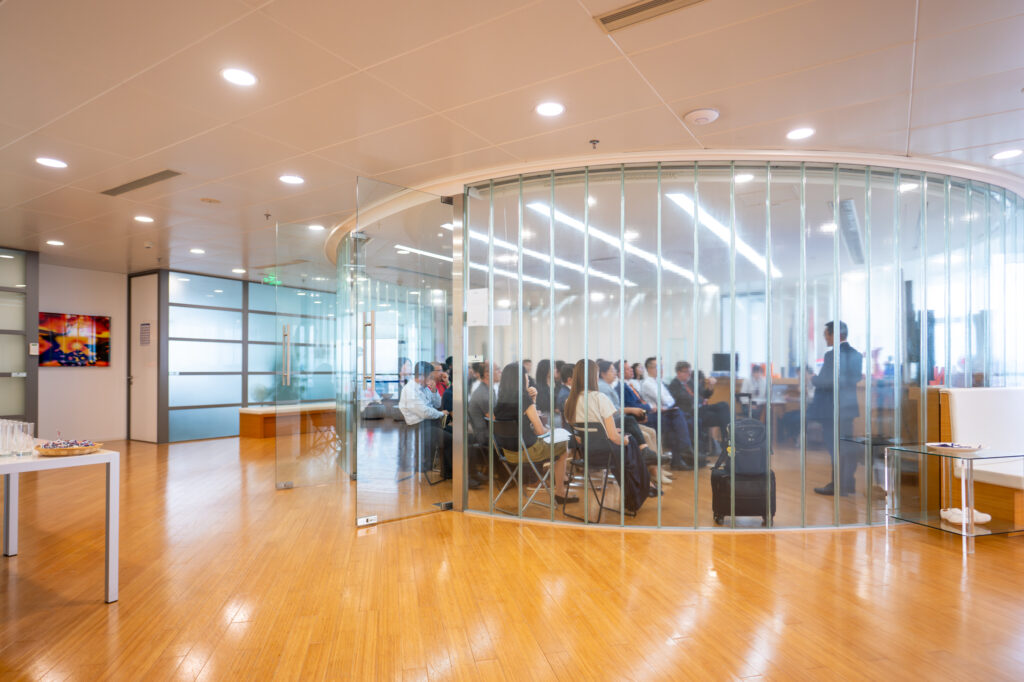
Conclusion and Future Directions
The seminar concluded with a Q&A session, where attendees had the opportunity to engage with the speakers and delve deeper into the topics discussed. Questions ranged from the economic viability of circular economy initiatives to the challenges of implementing bio-based materials and CCUS technologies. The discussions were lively and informative, reflecting the participants’ keen interest in these critical issues.
In his closing remarks, Consul General Efstathios Andreou reiterated the importance of collaboration between the Netherlands and China in addressing global environmental challenges. He expressed gratitude to the speakers and attendees for their contributions and emphasised the consulate’s commitment to supporting future initiatives in this field.
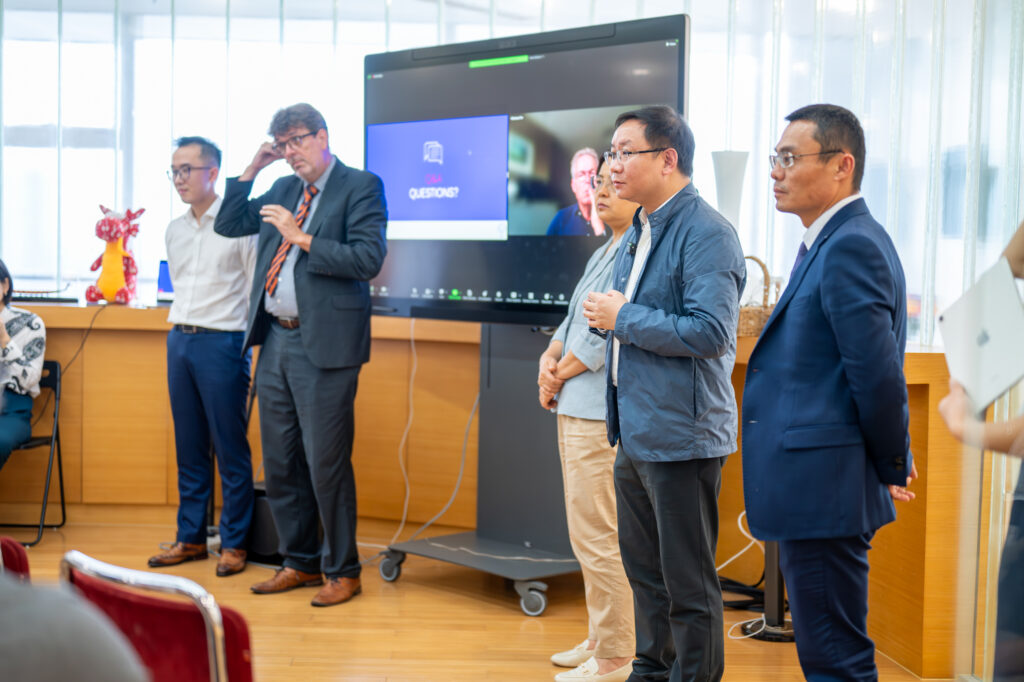
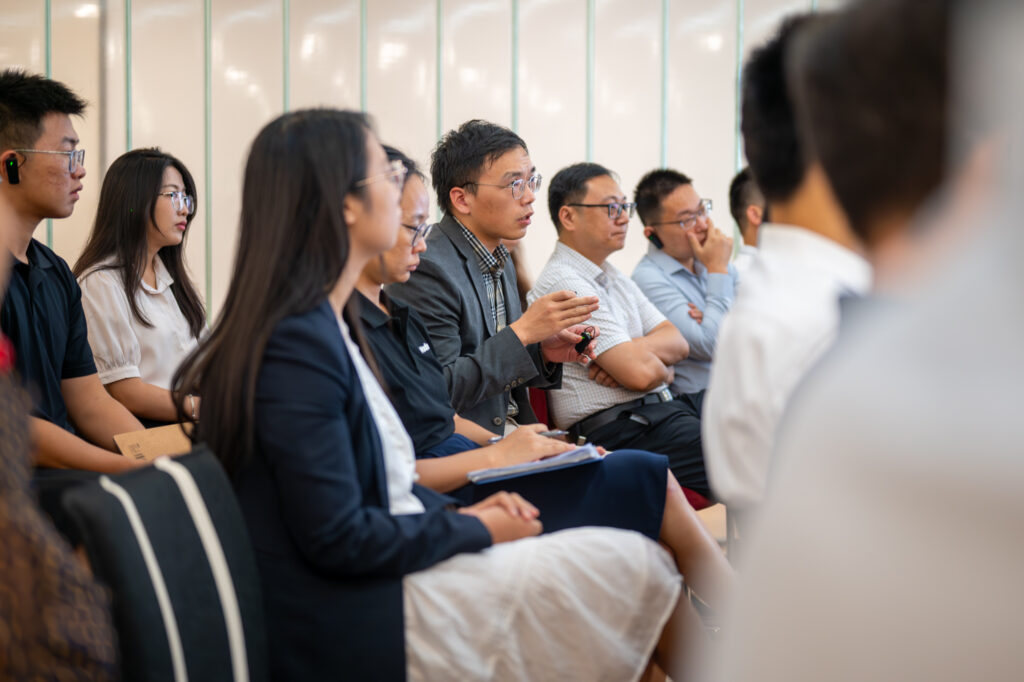
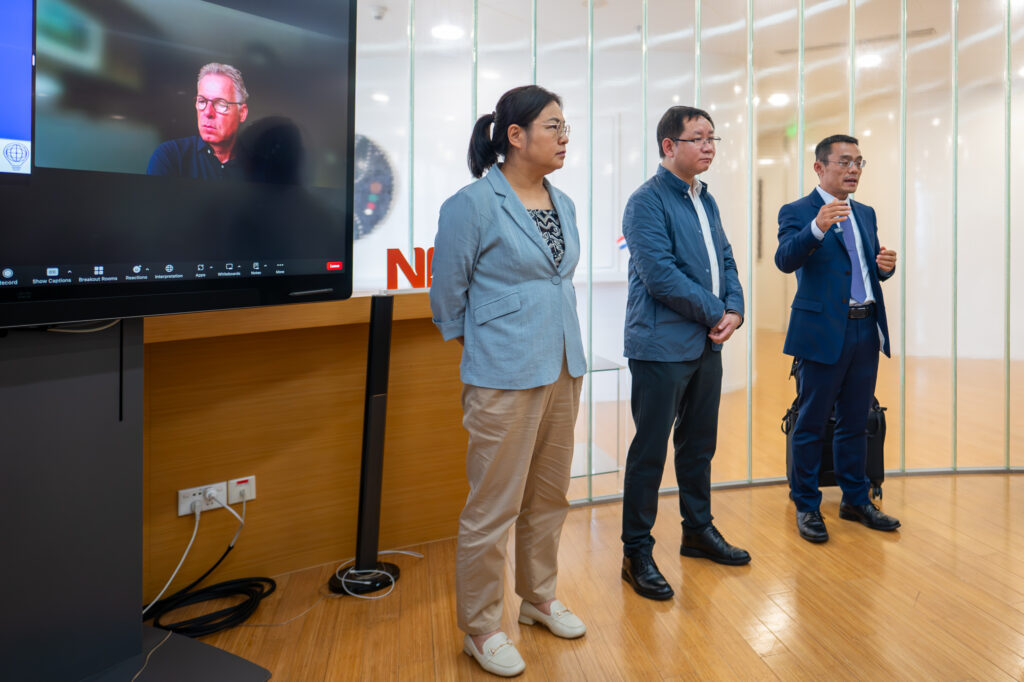
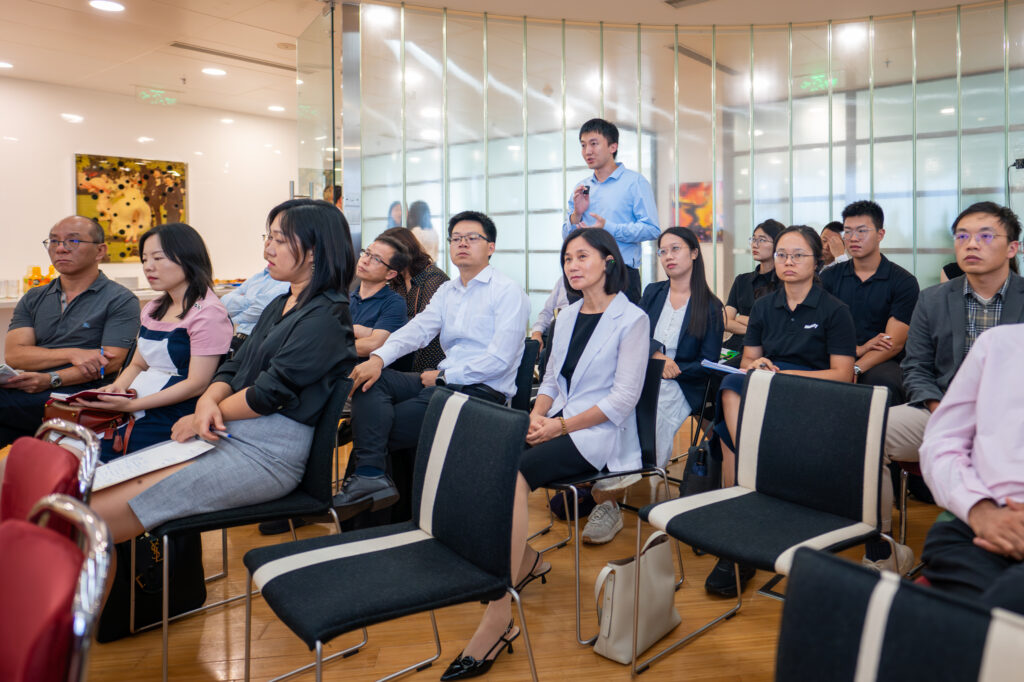
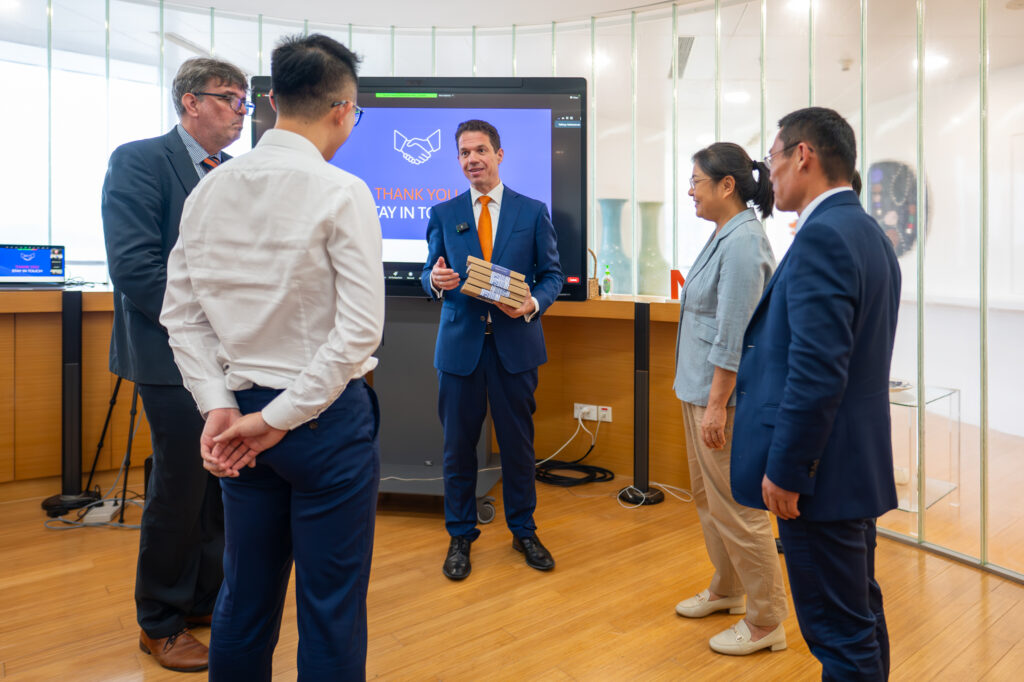
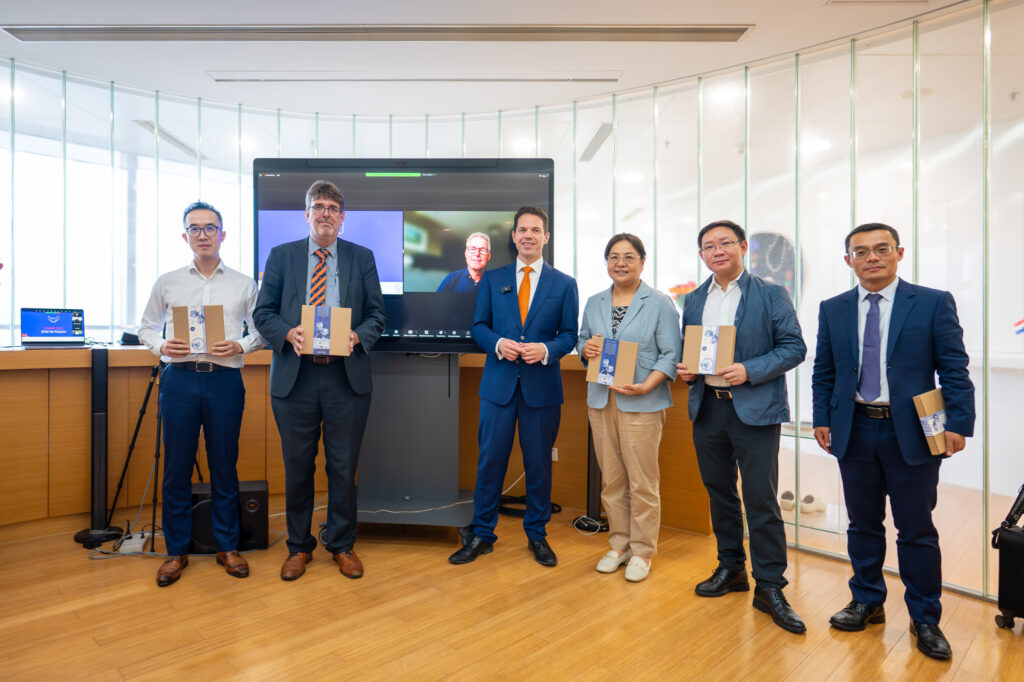
“The insights and innovations shared today highlight the tremendous potential for collaboration between our two nations. By working together, we can drive the transition to a circular economy and create a more sustainable future for all.”
Efstatios Andreou
After the seminar, there was time for networking with drinks and snacks. Speakers and participants joined in conversations and discussions.
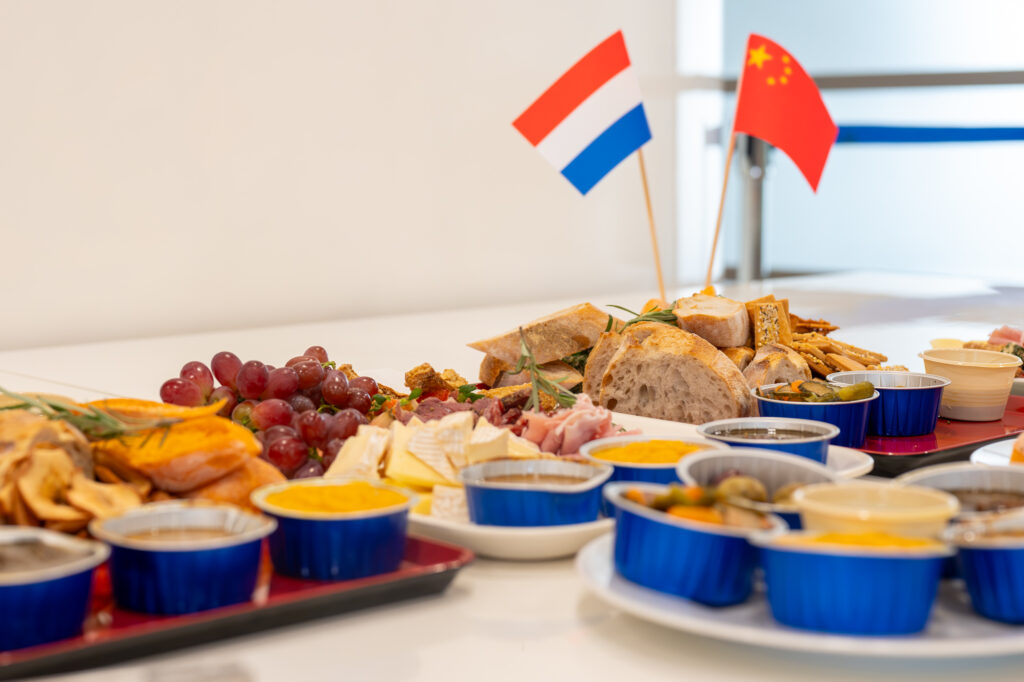


The seminar successfully provided a platform for sharing knowledge, exchanging ideas, and forging new partnerships. It highlighted the innovative approaches being pursued in both the Netherlands and China and underscored the potential for these two nations to lead the way in creating circular cities and sustainable economies. As the world continues to grapple with environmental crises, events like this seminar are crucial in fostering the international cooperation and innovative thinking needed to secure a sustainable future for all.
This was the second seminar in the series of three on circular cities. The first seminar, “From Research to Applications,” was held on 10 May 2024. The third seminar will be organised at a later date. Follow us for more updates.
